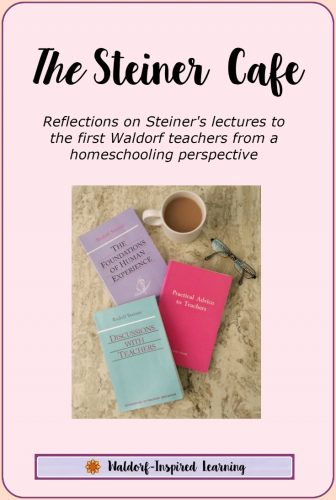On the eve of the Teacher’s Seminar in 1919, Rudolf Steiner delivered his “Opening Address” to those who would become teachers in the first Waldorf School. And right off, Steiner speaks of the necessity to make compromises. He explains that even though “the state imposes terrible learning goals and standards” that is what people are familiar with and believe in.
Steiner talks of the politics of the time, making statements that could easily be applied today in 2014! “People will be handled like puppets on a string, and everyone will think that this reflects the greatest progress imaginable.”
We are always attempting to “bring two contradictory forces into harmony,” that of “our ideals” and that of “conforming to what lies far from our ideals.” In order to bring these two “contradictory forces” into harmony, we must have flexibility! Ah, flexibility!!!
This could be the very description of homeschooling: we choose to homeschool because of the “terrible” (or misguided, inappropriate…fill in your own adjective here) goals and standards that the state imposes, even though many in the field of education think the latest new goals and standards reflect the greatest progress imaginable! And so we choose homeschooling, and work at bringing our ideals and requirements into harmony.
Steiner insists on teachers being “people of culture.” The enthusiasm that we need for our teaching comes from an interest in the world around us! I have known Waldorf teachers and parents who seem more isolated from the world, and so I appreciate the reminder that we want to have “a living interest in everything happening today.”
Throughout his “Opening Address,” Steiner instills in the teachers the magnitude of their undertaking with comments like:
- We have a difficult task ahead of us, but, nevertheless, we must do this cultural deed.
- Each of us must be completely responsible.
- This is a method of truly practical instruction.
- Flexibility of spirit and devotion to our tasks are necessary.
I find Steiner’s words so applicable to our times today and to homeschooling, in particular. My friend Alison, who will be joining me in commenting on these lectures, finds it particularly refreshing to think about Steiner as a “modern” man who participated in the circuit of intellectual and philosophical discussions taking place in salons and cafes throughout Europe in the early 1900s. Even the Teachers’ Seminar took place “in what had been a favorite restaurant-café for the citizens of Stuttgart until Molt bought it for the site of the new school.”
Once again, I am struck by the unbelievable undertaking of pulling together twelve individuals, mostly from non-teaching professions, delivering lectures for two weeks and then opening a school the next day!
What are the take-aways from Steiner’s “Opening Address” for us as teachers and homeschoolers?
Flexibility and compromise are required from day one! We are always striving for harmony. As teachers, we want to be people of culture and modern life. We must each take responsibility. And it is possible to decide to do something, make reasonable preparations, and then begin!

The Steiner Cafe is a place to explore and reflect on the lectures that Rudolf Steiner gave at the Teacher’s Seminar in 1919, the very first Waldorf teacher training.
To read reflections on previous lectures, check out The Steiner Cafe.
These lectures are published in three books. Below are affiliate links for your convenience. Click here to read my full disclosure policy. The morning lectures are found in The Foundations of Human Experience; later morning lectures in Practical Advice to Teachers; and afternoon lectures in Discussions with Teachers.
We invite you to pick up the books and read along. Or if you prefer, you can read online at www.rsarchive.org. Or listen at www.rudolfsteineraudio.com.
Lot’s of options! Hope you’ll join in the conversations.



Thank you Jean for undertaking this task! For a long time I have wanted to explore these lectures, but have found it difficult to make the time for it. Your synopsis and comments are just what I needed right now! I hope to explore Steiner more deeply in the future, but for today, I feel blessed to have your work to inspire me. Take care,
Amy
Thank you, Amy. So great to have others as co-travelers on this journey. And I’m glad to spread a little inspiration today! Flexibility while striving for harmony, that’s what I’m looking at today. Blessings to you.